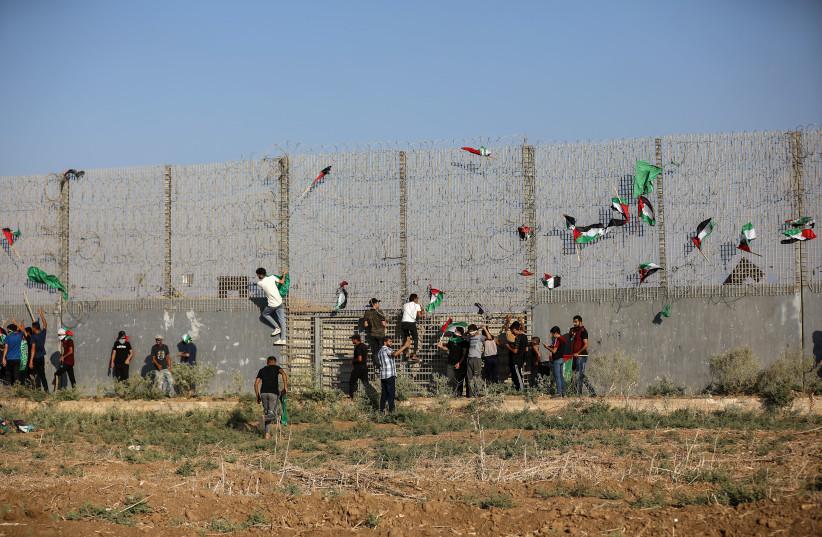
Hamas is fueling fires in Gaza, Lebanon – and then putting them out – analysis
With one hand, Hamas is heating up Gaza and on the other it is continuing to play a role in fighting in Lebanon, two spheres connected by Hamas’s influence. High level Hamas officials have been in Lebanon several times this year as the terror organization sought to unify its camps in Lebanon with Gaza. Yet in both places, it faces complex questions about when to escalate and how to deal with organizations like Palestinian Islamic Jihad in Gaza and other groups in Lebanon, as well as Hezbollah and its backers in Iraq.
Rioting along the Gaza border fence, including incidents that resulted in injuries, could indicate its intentions there, as anything that happens there happens either with Hamas’s permission or is due to a Hamas decision.
Over the last week, the IDF noted increased incidents along the Gaza border, “hundreds of rioters gathered in a violent riot adjacent to the security fence in the Gaza Strip” over the weekend, the military said, adding that “during the incident, a number of explosive devices were activated by the rioters. IDF soldiers in the area prepared for and acted against the violent riot with riot dispersal means.” In another incident, the IDF said it struck a military post belonging to Hamas in the northern part of the Strip.
These events are not new, reminding of similar incidents from 2018-2019 when Hamas launched the Great March of Return, massive weekly protests along the border, with tens of thousands of participants. Hundreds were injured at the time, before quiet ensued once again along the border. A number of IDF operations have taken place since 2018 as well.
Why is Hamas escalating now?
So why the escalation now? Hamas wants to remain relevant. It also has issues with funding in the Gaza Strip. A Qatari envoy was recently there, but it is not clear if Hamas has received what it wanted.
This is not the only arena in which Doha plays as the broker, making itself indispensable as the country that both talks to the extremists and cuts deals. For example, Qatar is the center of the deal brokered between the US and Iran, unfreezing $6 billion in frozen assets. Qatar also was involved in hosting the Taliban and helping with a deal with the US, such that the Taliban returned to Afghanistan and now run Kabul.
Meaning, if true, Hamas may be stoking tensions with Israel to create pressure for some kind of a deal. Additionally, the timing this escalation to coincide with the High Holy Days in Israel, as well as Prime Minister Benjamin Netanyahu’s trip to the US, cannot go unnoticed.
In Lebanon, Hamas has sought to broker a ceasefire between Palestinian factions in the Ein el-Hilweh camp, a historic refugee camp that has become a large overcrowded urban neighborhood in Sidon. There are thought to be 100,000 people in the area with a large amount of illegal weapons, including AK-47s, RPGs, and belt-fed machine guns. Over the last number of weeks, nearly 20 people have been killed in fighting there and many more wounded.
Arab News reported last week that “senior Hamas official Moussa Abu Marzouk will meet with Lebanese officials and representatives from the Palestinian factions to try and reach a settlement to end the clashes, the militant group said in a statement.” The report adds that Hamas did not take part in the clashes, adding that “the fighting broke out Thursday night after nearly a month of calm in Ein el-Hilweh between Palestinian President Mahmoud Abbas’s Fatah group and militant Islamist groups. Fatah and other allied factions had intended to crack down on suspects accused of killing Fatah military general, Abu Ashraf al Armoushi, in the camp in late July.”
Hamas, Fatah, and the Lebanese Army commander Gen. Joseph Aoun met with Prime Minister Najib Mikati last Wednesday, a meeting that gives an inkling into how the fighting in the camp could impact all of Lebanon. Hamas has also been sending leaders to Lebanon over the last year to threaten Israel, such as Salah Al-Arouri, who made comments about a regional conflict against Israel several weeks ago; he also paid Lebanon a visit just this weekend. It remains to be seen if Hamas can reduce the flames in Lebanon, while fanning them in Gaza, or if it is playing with too much fire in both places.
Source » jpost.com





